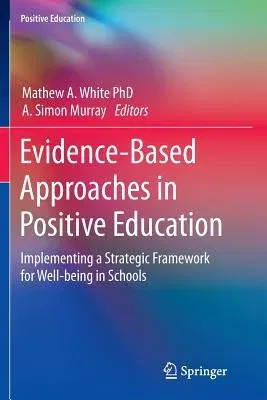Based on action research and implementation at one of the world's great
schools, this book provides a much-needed exploration of how to
implement positive education at a whole school level. Evidence-Based
Approaches in Positive Education summarises the integration of a
whole-school mental health and well-being strategy, positive psychology
programs and pastoral care models from 3 - 18 years of age. Positive
education is the teaching of scientifically validated programs from
positive psychology and character education that have an impact on
student and staff well-being. It is an approach that focuses on
teaching, building and embedding social and emotional learning
throughout a student's experience. St Peter's College - Adelaide is the
only institution in the world to integrate Martin Seligman's well-being
theory throughout all aspects of both its strategic intent and positive
education programs. The School's vision is to be a world-class school
where all boys flourish. Its mission is to provide an exceptional
education that brings out the very best in every boy. This is done
within an intellectually and spiritually rich environment that nurtures
international-mindedness, intercultural understanding, respect and a
commitment to social justice. This book captures the developments of the
St Peter's College journey. It focuses on the integration of well-being
across seven strategic goals: Academics; Well-being; Student Life;
Entrepreneurship; Innovation and Partnerships; People, Culture and
Change; Sustainability and Environment; Community Engagement,
Advancement, and Philanthropy. A uniquely Australian school, the impact
of a St Peter's College education is to build great men: who believe
safety, service and integrity and fundamental parts of their lives; who
are active members of communities that are socially and culturally
diverse; who engage in political, ethical, and environmental challenges
as good citizens. Since 1847, St Peter's College alumni have had global
and life-changing impact in all fields of human endeavour. The School's
alumni include three Nobel Laureates, 42 Rhodes Scholars, Olympians and
Archbishops, artists and scientists, educators and journalists, actors
and politicians, philanthropists and physicians, CEOs, diplomats and
soldiers, explorers, painters and poets. This book shares evidence-based
practices and makes a substantial contribution to the rapidly developing
field of positive psychology and its application in schools.


